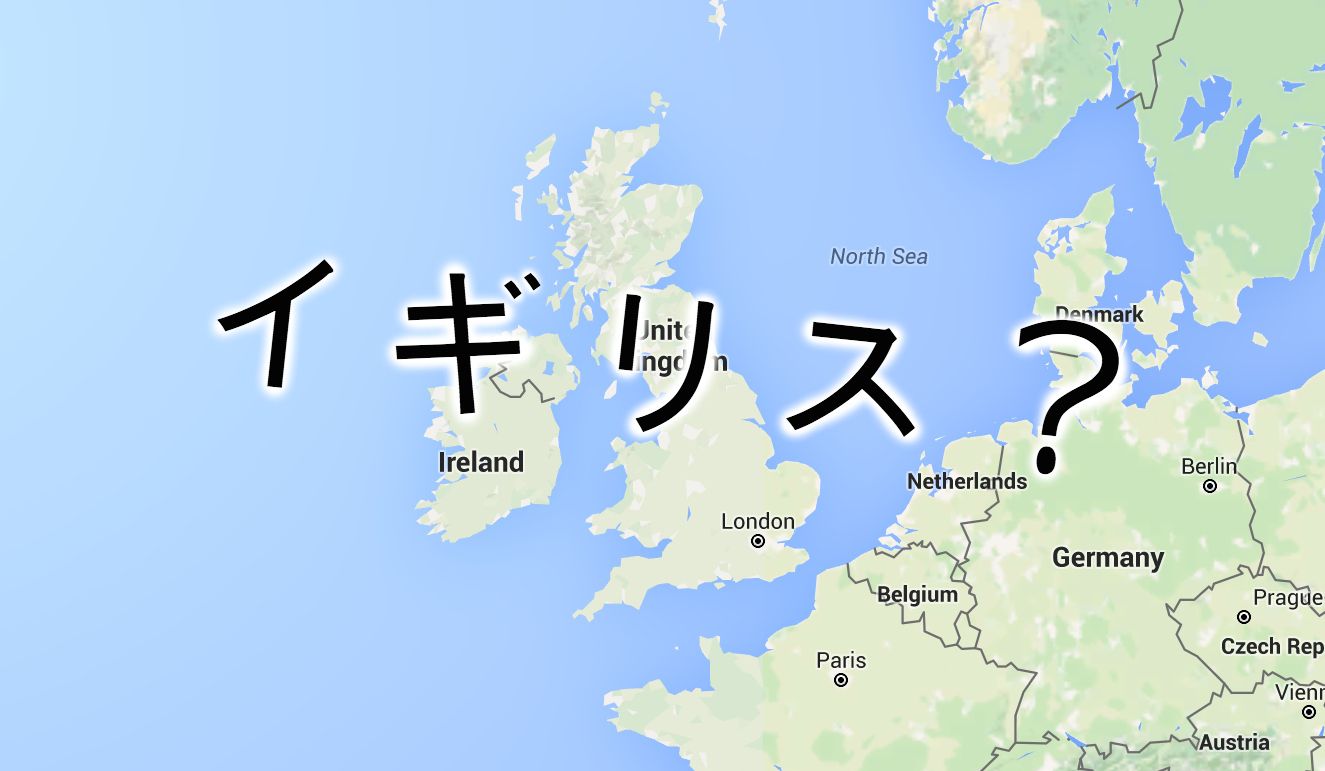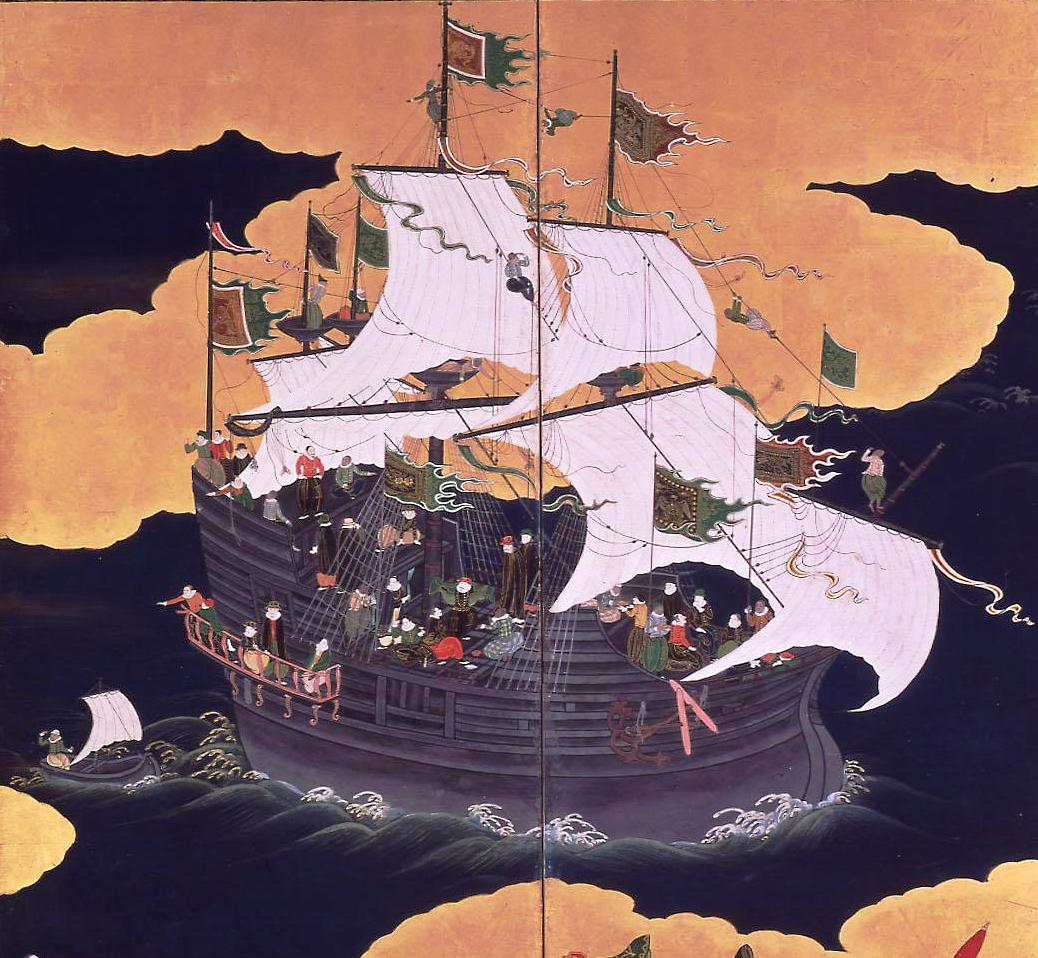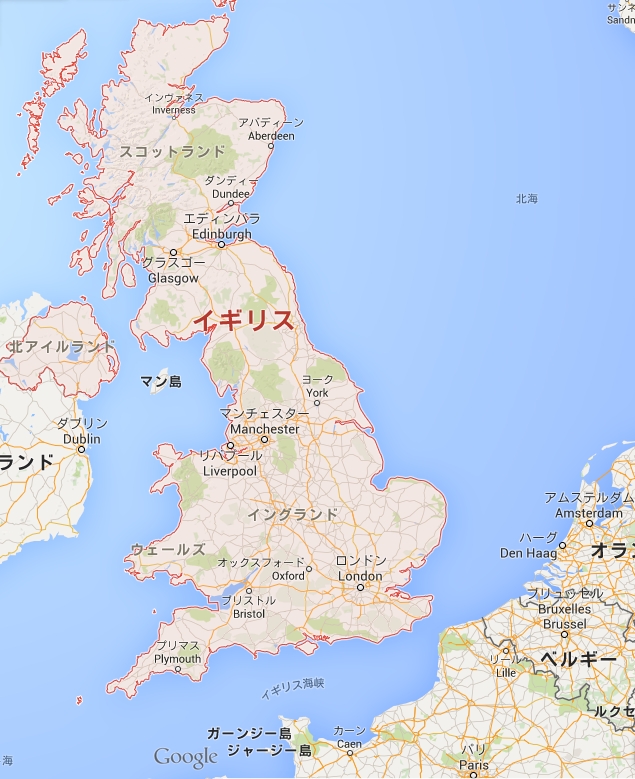
Amerika. Itaria. Kanada. The majority of countries are known in Japan by names that sound vaguely similar to their native monikers. So why on earth do the Japanese call the UK ‘Igirisu‘?
As anyone who has spent even a few hours studying Japanese will tell you, when adapted into the Japanese syllabary, foreign names can sound rather odd. Chris becomes Kurisu; my own name, Philip, becomes Firippu (yes, I get to have a random poo stuck on the end of my name 24/7); and if your name’s Deborah but you prefer to go by Deb you can forget about being taken seriously by kids because Debu, as your name will become, also means ‘fatty’ in Japanese.
But even with these many errant vowels and additional syllables, you have to admire Japan’s willingness to adapt foreign-sounding words into its own language. A great many countries’ names, too, are represented fairly faithfully in Japanese: the U.S. becomes Amerika; Germany, or rather Deutschland, becomes Doitsu; they even have a stab at pronouncing Australia (resulting in the admittedly rather cumbersome Oosutoraria, but still, full marks for effort, Japan!).
It’s understandable, then, that the question my friend Hiro asked on Facebook a few weeks ago should be one that a great many Japanese have asked me during my time in his homeland.
The short answer to this question is that it’s not, since England is called Ingurando in Japanese. Rather, what the Japanese are referring to—or at least ought to be referring to—when they say Igirisu is the United Kingdom as a whole.
It’s at this point that a number of the people reading this will shift uncomfortably in their seats as they, too, realise that they aren’t 100 percent sure of the difference between England, the UK and Great Britain. Fear not, gentle geographobe—a great many British nationals don’t know the difference either! For the unsure and those who’d like a recap, here’s the great and always informative YouTuber CGP Grey to explain everything you need to know about England, Britain and the UK.
Too long; didn’t watch? In brief, the UK is made up of four countries: England, Scotland, Wales and Northern Ireland. Britain, meanwhile, is the main island that the first three of those countries can be found on.
Now, with that out of the way we can get back to the question that stumps so many Japanese people and which has been put to me dozens of times over the years: Why is the UK called Igirisu in Japan?
In short, it’s all because of the Portuguese.
▼A Portuguese trading ship in Nagasaki

Hardcore Japanophiles will tell you that a great many words in the Japanese language—tempura, castella (a type of cake), pan (bread) to name but a few—come from the Portuguese. And they’d be right. Back in the days of long ocean voyages, tall ships and the trading of gunpowder for spices, the Portuguese were extremely busy boat-owning bees, sailing around the world getting things done. They first arrived in Japan in 1543, bringing with them a great many things that piqued Japanese curiosity—most notably the rather ironic combination of firearms and Christianity—and continued to trade and influence Japanese society for decades to come—they even turned Nagasaki into a thriving trading port.
Of course, the English (not to be confused with the British, thank you Mr Grey!) were also busy making a name for themselves around this time, sailing to foreign lands and loading their boats up with pretty much everything that wasn’t nailed to the floor, not to mention getting into sea scuffles with their various European neighbours. It stands to reason, then, that the English should come up in conversation between the Japanese and the Portuguese at some point during their bargaining and various cultural exchanges, with the latter telling of the Inglês (English), possibly while miming sipping tea with their pinky fingers outstretched or doing Basil Fawlty impressions (the Portuguese were were centuries ahead of their time).
With the English navy making a name for itself on the high seas and with England being the most populous country in Britain, it was only natural that the global community at that time should think of the English when they spoke of the island as a whole. On the international stage, Britain invariably meant the English, the Inglês, the people from 英吉利 Egeresu (later Igirisu)—a name which sticks to this day.
▼ A Japanese map of the UK and Ireland, the former marked in red and labelled イギリス Igirisu
It’s worth noting that today’s Japanese are perfectly familiar with the names Ingurando (England), Sukottorando (Scotland), Ueeruzu (Wales) and Kita Airurando (Northern Ireland), but the similarity between Ingurando and Igirisu often leads many to think that England and the UK are one and the same thing, which, as I’m sure my Scottish, Welsh and Northern Irish friends would like me to impress one last time, they’re not. The term 英国 Eikoku is also used to refer to the UK, much like how other countries have their own kanji-fied names (the US is also known as 米国 Beikoku, for example), but for the average Japanese citizen, the UK has always been, and probably always will be, Igirisu.
Class dismissed!
Featured image: Google Maps



 Everyday Japanese names that make English speakers chuckle
Everyday Japanese names that make English speakers chuckle Why you should be worried if someone calls you “Uehara-san” in the Japanese workplace
Why you should be worried if someone calls you “Uehara-san” in the Japanese workplace Why Foreign Businessmen are Receiving Lessons on Doing Business the Japanese Way
Why Foreign Businessmen are Receiving Lessons on Doing Business the Japanese Way Starbucks Japan releases first-ever Hinamatsuri Girls’ Day Frappuccino
Starbucks Japan releases first-ever Hinamatsuri Girls’ Day Frappuccino Drift ice in Japan is a disappearing winter miracle you need to see now
Drift ice in Japan is a disappearing winter miracle you need to see now Japan Extreme Budget Travel! A trip from Tokyo to Izumo for just 30,000 yen [Part 2]
Japan Extreme Budget Travel! A trip from Tokyo to Izumo for just 30,000 yen [Part 2] Sync! Illumination lets you watch Tokyo Disneyland Electrical Parade from home on multiple phones
Sync! Illumination lets you watch Tokyo Disneyland Electrical Parade from home on multiple phones 566 million yen in gold bars donated to Japanese city’s water bureau
566 million yen in gold bars donated to Japanese city’s water bureau Japanese video 18-Year-Old Grandpa has important, moving message behind its silly-sounding title
Japanese video 18-Year-Old Grandpa has important, moving message behind its silly-sounding title Photos from 140 years ago show Tokyo’s skyline was amazing long before the Skytree was ever built
Photos from 140 years ago show Tokyo’s skyline was amazing long before the Skytree was ever built Shin Godzilla trailer released, hits very close to home【Video】
Shin Godzilla trailer released, hits very close to home【Video】 Top 100 manga of all time chosen by survey of 150,000 Japanese people
Top 100 manga of all time chosen by survey of 150,000 Japanese people Which convenience store onigiri rice balls are the most popular? Survey reveals surprising results
Which convenience store onigiri rice balls are the most popular? Survey reveals surprising results Highest Starbucks in Japan set to open this spring in the Tokyo sky
Highest Starbucks in Japan set to open this spring in the Tokyo sky The 10 most annoying things foreign tourists do on Japanese trains, according to locals
The 10 most annoying things foreign tourists do on Japanese trains, according to locals Tokyo Skytree turns pink for the cherry blossom season
Tokyo Skytree turns pink for the cherry blossom season Yakuzen ramen restaurant in Tokyo is very different to a yakuza ramen restaurant
Yakuzen ramen restaurant in Tokyo is very different to a yakuza ramen restaurant Shibuya Station’s Hachiko Gate and Yamanote Line stairway locations change next month
Shibuya Station’s Hachiko Gate and Yamanote Line stairway locations change next month Starbucks Japan releases new sakura goods and drinkware for cherry blossom season 2026
Starbucks Japan releases new sakura goods and drinkware for cherry blossom season 2026 Starbucks Japan adds new sakura Frappuccino and cherry blossom drinks to the menu
Starbucks Japan adds new sakura Frappuccino and cherry blossom drinks to the menu Japan Extreme Budget Travel! A trip from Tokyo to Izumo for just 30,000 yen [Part 1]
Japan Extreme Budget Travel! A trip from Tokyo to Izumo for just 30,000 yen [Part 1] Japan’s new “Cunte” contact lenses aren’t pronounced like you’re probably thinking they are
Japan’s new “Cunte” contact lenses aren’t pronounced like you’re probably thinking they are Japan’s newest Shinkansen has no seats…or passengers [Video]
Japan’s newest Shinkansen has no seats…or passengers [Video] Foreigners accounting for over 80 percent of off-course skiers needing rescue in Japan’s Hokkaido
Foreigners accounting for over 80 percent of off-course skiers needing rescue in Japan’s Hokkaido Super-salty pizza sends six kids to the hospital in Japan, linguistics blamed
Super-salty pizza sends six kids to the hospital in Japan, linguistics blamed Starbucks Japan unveils new sakura Frappuccino for cherry blossom season 2026
Starbucks Japan unveils new sakura Frappuccino for cherry blossom season 2026 Foreign tourists in Japan will get free Shinkansen tickets to promote regional tourism
Foreign tourists in Japan will get free Shinkansen tickets to promote regional tourism Take a trip to Japan’s Dododo Land, the most irritating place on Earth
Take a trip to Japan’s Dododo Land, the most irritating place on Earth Naruto and Converse team up for new line of shinobi sneakers[Photos]
Naruto and Converse team up for new line of shinobi sneakers[Photos] Is China’s don’t-go-to-Japan warning affecting the lines at a popular Tokyo gyukatsu restaurant?
Is China’s don’t-go-to-Japan warning affecting the lines at a popular Tokyo gyukatsu restaurant? Survey asks foreign tourists what bothered them in Japan, more than half gave same answer
Survey asks foreign tourists what bothered them in Japan, more than half gave same answer Japan’s human washing machines will go on sale to general public, demos to be held in Tokyo
Japan’s human washing machines will go on sale to general public, demos to be held in Tokyo Starbucks Japan releases new drinkware and goods for Valentine’s Day
Starbucks Japan releases new drinkware and goods for Valentine’s Day We deeply regret going into this tunnel on our walk in the mountains of Japan
We deeply regret going into this tunnel on our walk in the mountains of Japan Studio Ghibli releases Kodama forest spirits from Princess Mononoke to light up your home
Studio Ghibli releases Kodama forest spirits from Princess Mononoke to light up your home Major Japanese hotel chain says reservations via overseas booking sites may not be valid
Major Japanese hotel chain says reservations via overseas booking sites may not be valid Put sesame oil in your coffee? Japanese maker says it’s the best way to start your day【Taste test】
Put sesame oil in your coffee? Japanese maker says it’s the best way to start your day【Taste test】 No more using real katana for tourism activities, Japan’s National Police Agency says
No more using real katana for tourism activities, Japan’s National Police Agency says